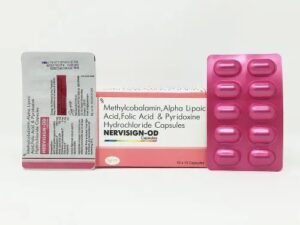1. Introduction to NERVISIGN-OD
NERVISIGN-OD is a medication that is commonly prescribed to treat various conditions related to the nervous system. It contains a combination of active ingredients that work together to provide therapeutic effects. This comprehensive guide aims to provide you with essential information about the uses, dosage, side effects, and precautions associated with NERVISIGN-OD.
2. Uses of NERVISIGN-OD
NERVISIGN-OD is used for the treatment of several nervous system disorders. The primary uses of NERVISIGN-OD include:
- Peripheral neuropathy: NERVISIGN-OD is prescribed to alleviate the symptoms associated with peripheral neuropathy, which is characterized by nerve damage that affects the extremities.
- Neuropathic pain: NERVISIGN-OD may be used to manage neuropathic pain, a type of chronic pain caused by nerve damage or dysfunction.
- Vitamin B12 deficiency: NERVISIGN-OD contains vitamin B12, which is essential for the proper functioning of the nervous system. It is used to treat vitamin B12 deficiency, which can lead to neurological symptoms.
3. Dosage of NERVISIGN-OD
The dosage of NERVISIGN-OD may vary depending on the specific condition being treated and individual patient factors. It is crucial to follow the instructions provided by your healthcare provider or refer to the medication package insert for the recommended dosage.
- Peripheral neuropathy: The typical dosage of NERVISIGN-OD for peripheral neuropathy is one tablet taken orally once daily. However, the dosage may be adjusted based on the severity of the condition and the individual response to treatment.
- Neuropathic pain: The dosage of NERVISIGN-OD for neuropathic pain may vary depending on the severity of the pain and the individual patient’s response. It is important to follow the healthcare provider’s instructions regarding the dosage and duration of treatment.
- Vitamin B12 deficiency: The dosage of NERVISIGN-OD for treating vitamin B12 deficiency depends on the severity of the deficiency and the underlying cause. Your healthcare provider will determine the appropriate dosage for your specific needs.
It is essential to take NERVISIGN-OD as prescribed and adhere to the recommended dosage schedule. Do not adjust the dosage or stop taking the medication without consulting your healthcare provider.
4. Side Effects of NERVISIGN-OD
NERVISIGN-OD may cause certain side effects, although not everyone experiences them. It is important to be aware of potential side effects and promptly inform your healthcare provider if you experience any concerning symptoms.
- Common side effects: Common side effects of NERVISIGN-OD may include nausea, vomiting, diarrhea, headache, dizziness, and allergic reactions such as rash or itching. These side effects are generally mild and temporary. If they persist or worsen, it is recommended to consult your healthcare provider.
- Serious side effects: Although rare, NERVISIGN-OD may cause serious side effects in some individuals. These may include severe allergic reactions, difficulty breathing, chest pain, rapid heartbeat, or swelling of the face, lips, tongue, or throat. If you experience any of these symptoms, seek immediate medical attention.
5. Precautions When Using NERVISIGN-OD
While using NERVISIGN-OD, it is important to take certain precautions to ensure safe and effective use of the medication. Consider the following:
- Allergies: If you have a known allergy to any of the active ingredients in NERVISIGN-OD, inform your healthcare provider before starting the medication. Allergic reactions to NERVISIGN-OD can be serious and require immediate medical attention.
- Other medications: Inform your healthcare provider about all the medications, supplements, or herbal products you are currently taking. Some medications may interact with NERVISIGN-OD, potentially affecting its effectiveness or increasing the risk of side effects.
- Pregnancy and breastfeeding: If you are pregnant, planning to become pregnant, or breastfeeding, discuss the use of NERVISIGN-OD with your healthcare provider. The safety of NERVISIGN-OD during pregnancy and breastfeeding has not been established, and your healthcare provider can provide guidance on the potential risks and benefits.
- Underlying medical conditions: Inform your healthcare provider about any pre-existing medical conditions you have, especially if you have a history of kidney or liver disease. Your healthcare provider will consider these factors when determining the suitability of NERVISIGN-OD for your condition.
FAQs
- Can NERVISIGN-OD be used for children? NERVISIGN-OD is typically prescribed for adults. The use of NERVISIGN-OD in children should be determined by a healthcare provider based on the specific condition and individual circumstances.
- How long does it take for NERVISIGN-OD to show its effects? The time it takes for NERVISIGN-OD to show its effects may vary depending on the individual and the condition being treated. It is important to follow the prescribed dosage and allow sufficient time for the medication to take effect. Consult your healthcare provider for more information.
- Can NERVISIGN-OD be taken with food? NERVISIGN-OD can be taken with or without food. However, taking it with food may help reduce the likelihood of gastrointestinal discomfort.
- Are there any dietary restrictions while taking NERVISIGN-OD? There are no specific dietary restrictions associated with NERVISIGN-OD. However, maintaining a balanced diet that includes sources of vitamin B12 is important for overall health.
- Can NERVISIGN-OD interact with other medications? NERVISIGN-OD may interact with certain medications. It is important to inform your healthcare provider about all the medications, supplements, or herbal products you are taking to avoid potential drug interactions.
- Can NERVISIGN-OD be used for nerve pain caused by diabetes? NERVISIGN-OD may be used to manage neuropathic pain, including pain caused by diabetes-related nerve damage. However, the suitability of NERVISIGN-OD for your specific condition should be determined by your healthcare provider.
- Can NERVISIGN-OD be used long-term? The duration of NERVISIGN-OD treatment may vary depending on the condition being treated and individual patient factors. It is important to follow your healthcare provider’s instructions regarding the duration of treatment.
- Can NERVISIGN-OD cause drowsiness? Drowsiness is not a common side effect of NERVISIGN-OD. However, individual responses to medications may vary. If you experience drowsiness or any other concerning symptoms, consult your healthcare provider.
- Can NERVISIGN-OD be used for vitamin B12 supplementation? NERVISIGN-OD can be used to treat vitamin B12 deficiency. However, if you are considering vitamin B12 supplementation for general health purposes, it is advisable to consult your healthcare provider for appropriate recommendations.
- Can NERVISIGN-OD be discontinued abruptly? It is important to follow your healthcare provider’s instructions regarding the discontinuation of NERVISIGN-OD. Abruptly stopping the medication without medical guidance may have adverse effects. Consult your healthcare provider for proper guidance on discontinuation.
- What should I do if I miss a dose of NERVISIGN-OD? If you miss a dose of NERVISIGN-OD, take it as soon as you remember. However, if it is close to the time for your next scheduled dose, skip the missed dose and resume your regular dosing schedule. Do not double the dose to make up for a missed one.
- Can NERVISIGN-OD be taken with other vitamins or supplements? It is generally safe to take NERVISIGN-OD with other vitamins or supplements. However, it is recommended to inform your healthcare provider about all the supplements you are taking to ensure there are no potential interactions.
- Can NERVISIGN-OD cause weight gain? Weight gain is not a common side effect of NERVISIGN-OD. However, individual responses to medications may vary. If you notice any changes in weight or have concerns, consult your healthcare provider.
- Can NERVISIGN-OD be used for the treatment of multiple sclerosis (MS)? NERVISIGN-OD is not typically used for the treatment of multiple sclerosis. The management of multiple sclerosis usually requires a comprehensive approach and may involve other specific medications. Consult a neurologist for appropriate treatment options.
- Can NERVISIGN-OD be purchased without a prescription? NERVISIGN-OD is a prescription medication and should not be purchased or used without a valid prescription from a healthcare provider.
- Can NERVISIGN-OD cause interactions with alcohol? It is generally advisable to avoid or limit alcohol consumption while taking NERVISIGN-OD. Alcohol can potentially interact with the medication and increase the risk of side effects.
- Can NERVISIGN-OD be used during pregnancy? The use of NERVISIGN-OD during pregnancy should be discussed with your healthcare provider. They can provide guidance on the potential risks and benefits and determine the appropriate course of action.
- Can NERVISIGN-OD be taken by breastfeeding mothers? It is important to consult your healthcare provider before taking NERVISIGN-OD while breastfeeding. They can provide personalized advice considering the potential risks and benefits for both the mother and the baby.
- Can NERVISIGN-OD be used by older adults? NERVISIGN-OD can be used by older adults under appropriate medical supervision. However, individual factors and specific health conditions should be considered when determining the suitability of NERVISIGN-OD for older adults.
- Can NERVISIGN-OD cause allergic reactions? Allergic reactions to NERVISIGN-OD are possible, although they are rare. If you experience symptoms such as rash, itching, swelling, or difficulty breathing, seek immediate medical attention.
- Can NERVISIGN-OD be used for the treatment of trigeminal neuralgia? NERVISIGN-OD is not commonly used for the treatment of trigeminal neuralgia. There are other specific medications and treatment approaches available for managing trigeminal neuralgia. Consult a healthcare provider for appropriate treatment options.
- Can NERVISIGN-OD interact with blood thinners? NERVISIGN-OD may interact with certain blood thinners. It is important to inform your healthcare provider about all the medications you are taking, including blood thinners, to avoid potential drug interactions.
- Can NERVISIGN-OD be used for diabetic neuropathy? NERVISIGN-OD may be used to manage neuropathic pain associated with diabetic neuropathy. However, the appropriateness of NERVISIGN-OD for your specific condition should be determined by your healthcare provider.
- Can NERVISIGN-OD cause stomach upset? Stomach upset, including nausea and diarrhea, is a possible side effect of NERVISIGN-OD. If these symptoms persist or worsen, consult your healthcare provider.
- Can NERVISIGN-OD be used for the treatment of sciatica? NERVISIGN-OD is not typically used as a first-line treatment for sciatica. The management of sciatica usually involves pain relief medications and physical therapy. Consult a healthcare provider for appropriate treatment options.
- Can NERVISIGN-OD be taken before or after meals? NERVISIGN-OD can be taken with or without food, as directed by your healthcare provider. However, taking it with food may help reduce the likelihood of gastrointestinal discomfort.
- Can NERVISIGN-OD interact with antidepressant medications? NERVISIGN-OD may interact with certain antidepressant medications. It is important to inform your healthcare provider about all the medications you are taking to avoid potential drug interactions.
- Can NERVISIGN-OD cause dizziness? Dizziness is a possible side effect of NERVISIGN-OD. If you experience dizziness or any other concerning symptoms, consult your healthcare provider.
- Can NERVISIGN-OD be used for the treatment of postherpetic neuralgia? NERVISIGN-OD may be used to manage postherpetic neuralgia, a complication of shingles. However, the suitability of NERVISIGN-OD for your specific condition should be determined by your healthcare provider.
- Can NERVISIGN-OD be used for the treatment of restless leg syndrome (RLS)? NERVISIGN-OD is not typically used as a first-line treatment for restless leg syndrome. There are other specific medications and treatment approaches available for managing RLS. Consult a healthcare provider for appropriate treatment options.
It is important to consult your healthcare provider for personalized advice and guidance regarding the use of NERVISIGN-OD, as individual circumstances may vary.

